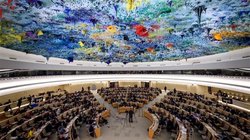 It is unfortunate to hear that European Union ambassadors have decided to leave sanctions imposed on a number of Iranian individuals for alleged human rights abuses in place for another year.
It is unfortunate to hear that European Union ambassadors have decided to leave sanctions imposed on a number of Iranian individuals for alleged human rights abuses in place for another year. RNA - This is while the Iranian Judiciary’s High Council for Human Rights has also lambasted the United Nations’ special rapporteur for human rights in Iran for his latest report on the country. In his report submitted to the UN Human Rights Council (UNHRC), UN Special Rapporteur on the Situation of Human Rights in Iran Javaid Rehman voiced concern over human rights violations in Iran.
That the new reports and sanctions are baseless and politicized are beyond dispute. What’s new is that they are based on numerous interviews with various anti-Iran media outlets in the West, including the BBC, the VOA, Radio Farda and so on, which are well known for their hostile reports against Iran. This is a blatant violation of the UN framework, within which special rapporteurs are chosen.
It is an open secret that violations, double standards and politicization of human rights agenda by certain members of UNHRC have now become a routine. This has made many member states like Iran to react. Not by naming and shaming certain hypocritical governments that have double standard and fail, but by promoting dialogue and exchange on the basis of mutual respect and equality.
It is very difficult to come up with any counterargument to dismiss such a progressive call for promotion of international dialogue and cooperation. On balance, nothing is wrong with playing a positive role in global politics, excuse yourself from the table of negativity at the UNHRC and lean forward in peace, and/or uphold the purposes and principles of the Charter of United Nations, respect sovereignty and territorial integrity of all nations, and work consistently with the international civil society in an impartial, objective, constructive, and non-selective manner.
Confrontation or raising baseless accusations about an important subject matter such as human rights in Iran will take the Council and its decisions nowhere. Baseless accusations and confrontations as such only embed an enduring showdown, harbor intense apprehension, and fuel distrust and enmity, ultimately bringing the UNHRC and officials unwittingly to their knees.
This should be avoided at all costs. Being loose domestically and strict abroad is contrasting principles for the European Union and/or the United States, which are always behind anti-Iran human rights reports. They need to walk the talk before criticizing others for alleged human rights violations when they themselves practice just that. A case in point could be the ongoing violent protests by the Yellow Jackets in France, during which many protesters have been injured, blinded and even killed. How come, the UNHRC never bothers to issue a report to condemn such violations in the heart of the European continent?
Nevertheless, the time is now for Western nations to prove they also respect human rights. They should never defend their own national interests or wield human rights issues and sanctions as a political tool. In fact, all UNHRC member states should dispose of their human rights plaything, and live up to their standards and commitments.
History suggests that when human rights reports and discussions are embroiled in controversy, thrown aside, ignored or politicized in such sessions, there is no game in progress. Concern for human rights and international justice should never come only when some member states see it as crucial to their own national and geopolitical interests.
The same rule applies to UNHRC policymakers and rapporteurs, as they are the ones that pen the Council’s annual human rights reports. They should avoid hypocritical and misleading accounts, divorce themselves from one-size-fits-all approach, take into account national conditions, and employ similar language for everyone. It might turn out to be the only key to significant progress and credibility for the Council.
There can be no doubt that it will take realpolitik even more than morality or enlightenment for the Council to indulge in such policies and practices. In the absence of realpolitik, there is too little incentive for policymakers and rapporteurs to actually bring about the sort of changes and reforms that would make universal human rights violations and hypocrisies a thing of the past.
847/940